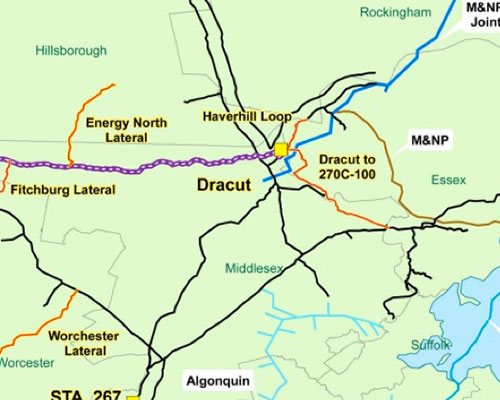Pipeline map showing Haverhill loop.

Massachusetts Attorney General Maura Healey.
Attorney General Maura Healey Monday urged federal regulators to undertake a rigorous review of the impacts of the proposed Kinder Morgan pipeline, a portion of which would pass through Andover and add a “Haverhill Loop,” before allowing the project to move forward.
In “scoping comments” filed Oct. 16 with the Federal Energy Regulatory Commission (FERC), Healey renewed her call for a comprehensive evaluation of Kinder Morgan’s proposed Northeast Energy Direct (NED) interstate gas pipeline to progress, according to a statement. As proposed by Kinder Morgan’s Tennessee Gas Pipeline Company, the NED project is a new 30-inch pipeline designed to deliver up to 1.3 billion cubic feet per day of natural gas from Wright, New York, to Dracut, at a total cost of at least $3 billion. About 64 miles of the proposed pipeline’s 188-mile length would be located in Massachusetts. The pipeline proposal in Andover is part of a planned branch extension to Lynnfield from an existing main pipeline in Dracut. Last February, Kinder Morgan and its subsidiary Tennessee Gas presented plans to Andover residents in a forum held at Wyndham Hotel, Andover.
“This proposed pipeline would have a significant impact on local residents and the energy future of Massachusetts,” Healey said. “FERC should fully evaluate the need for this project in conjunction with other pipeline proposals for the region. My office will continue to play an active role in proceedings for this pipeline moving forward.”
If constructed, the NED project would have major and lasting consequences for Massachusetts communities, the Commonwealth’s natural resources, and the economy and energy systems throughout the Northeastern United States, according to Healey’s written comments to FERC Secretary Kimberly D. Bose.
“Other stakeholders, including over 50 Massachusetts municipalities, regional planning organizations, clean energy advocates, property owners, environmentalists, community groups, power generators and liquefied natural gas (LNG) interests, have vigorously opposed new pipeline development, and the NED project in particular, arguing that such development requires significant environmental and other impacts that are unacceptable to local residents and communities; new fossil fuel pipelines are antithetical to the region’s goals to reduce energy sector greenhouse gas emissions; and pipeline system constraints and incremental gas capacity needs, if any, are short in duration and can be addressed through better use of the existing natural gas system and alternative energy solutions like energy efficiency and renewables.”
“The attorney general’s office will soon release a study it commissioned… that examines the extent of New England’s need for additional energy supplies to ensure electric system reliability through the year 2030, and analyzes alternative solutions to meeting any such need, including the costs to ratepayers and effects on greenhouse gas emissions,” Healey said.
FERC is an independent agency that regulates the interstate transmission of electricity, natural gas, and oil, and reviews all proposals to build natural gas pipelines. Before FERC decides whether or not to approve a pipeline proposal, it conducts a review under the National Environmental Policy Act (NEPA) evaluating the project’s environmental impacts and considering reasonable project alternatives, taking into account the purpose and need for the project, according to a spokesperson.
